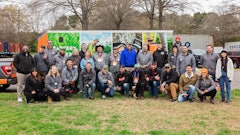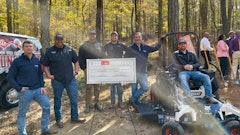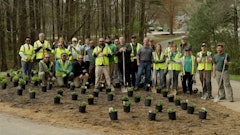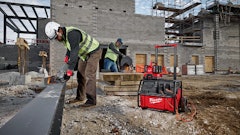This year’s Hidden Gems are built around great service and impressive growth. Behind every great company is a group of great employees. And in an industry that often has problems attracting good employees, the following best practices become a great tool for change.
Competitive Pay and Benefits
People are in this business not only for the love of landscaping, but also because everybody’s got to make a living. Employers who offer their employees competitive pay and benefits are a great example of how to hang onto top-notch workers.
One great example is Green Lawn Specialists in Lewis Center, OH. They run their business in a way that the employees think of it as a career and not a temporary job. Green Lawn offers competitive pay along with the assurance that their employees have a year-round job, receive benefits and are able to take sick days.
Joshua Taylor, of Taylor’s Trees & Turf in Princeton, IL, explains why it’s important for their company. “Being the top service provider in our area allows us to pay our employees at the highest level and provide other incentives like bonuses, retirement plans and insurance. It nurtures a fun, energetic work environment.”
Flexible Time Off
From vacations to simply taking time off to spend with family or recover from an illness, employees aren’t robots just yet, and sometimes they need a little downtime. This is a universal best practice—not even just in the green industry. Employees who are given flexible time off are happier, and in turn, end up being more productive workers.
An example is Green EffeX in Naples, FL. The company offers three weeks of vacation time to workers who have been there for five years. Land Expressions in Mead, WA, is another company that takes into account their employees' families. If a Land Expressions employee needs to attend their child’s sport game or school event, they are allowed to take that time off during the workday.
Team Involvement
Now this is really what separates good companies from the bad, and being creative will help you succeed in creating a happy, hardworking team.
“I make all my employees feel like they are family. We go on company trips, have monthly cookouts and I provide lunch once a week,” says Scott Horoszewski, owner of Acme NLS in Swanton, OH. “I keep a lot of my employees, and the ones who leave want to come back.”
In Victor, NY, John Welch Enterprise knows that they’re only as good as the people they hire. That’s why they take the time to meet together through breakfasts and community volunteer work. Employees there aren’t limited to expressing their concerns during meetings either, as there’s an open door policy.
Doug McDuff, owner of Landscape America in Wrentham, MA, explains that they communicate openly with their team. “Every employee has the opportunity to voice their opinion, see our numbers and understand where we are headed as a team. Growth is really important to them, because it’s evident that there is no ceiling to what they can do."
Training
While a company can pick out great employees, training and how you go about it is still a big factor. Something companies often overlook is that training can not only "green up your team", but also encourages employee retention. Training also goes beyond the initial new-hire phase. Companies like Tab Property Enhancement in Brunswick, OH, has their team do something different every day; that way they’re learning new skills while at the same time keeping the job interesting.
A big part of the industry is indeed outside education. Perfect Turf Landscaping in Dallas, GA, attends, as a team, at least one trade show or seminar a year. They also bring in trade-specific trainers to coach the team in practices like pruning, production and team building.
SIDEBAR: Drawing high school students to the industry
Land Expressions in Mead, WA, has started a program with its local high school, Mt. Spokane High School, to work with students who do not have the desire nor means to pursue college. The program gives on the job training for several hours per week throughout the academic year. The students work in the office and in the field when possible. "We mentor them in professionalism and social expectations," says Dave Nelson, company owner. "We provide broad experience for them by having them work in our office as well as with the landscape installation crew."





























